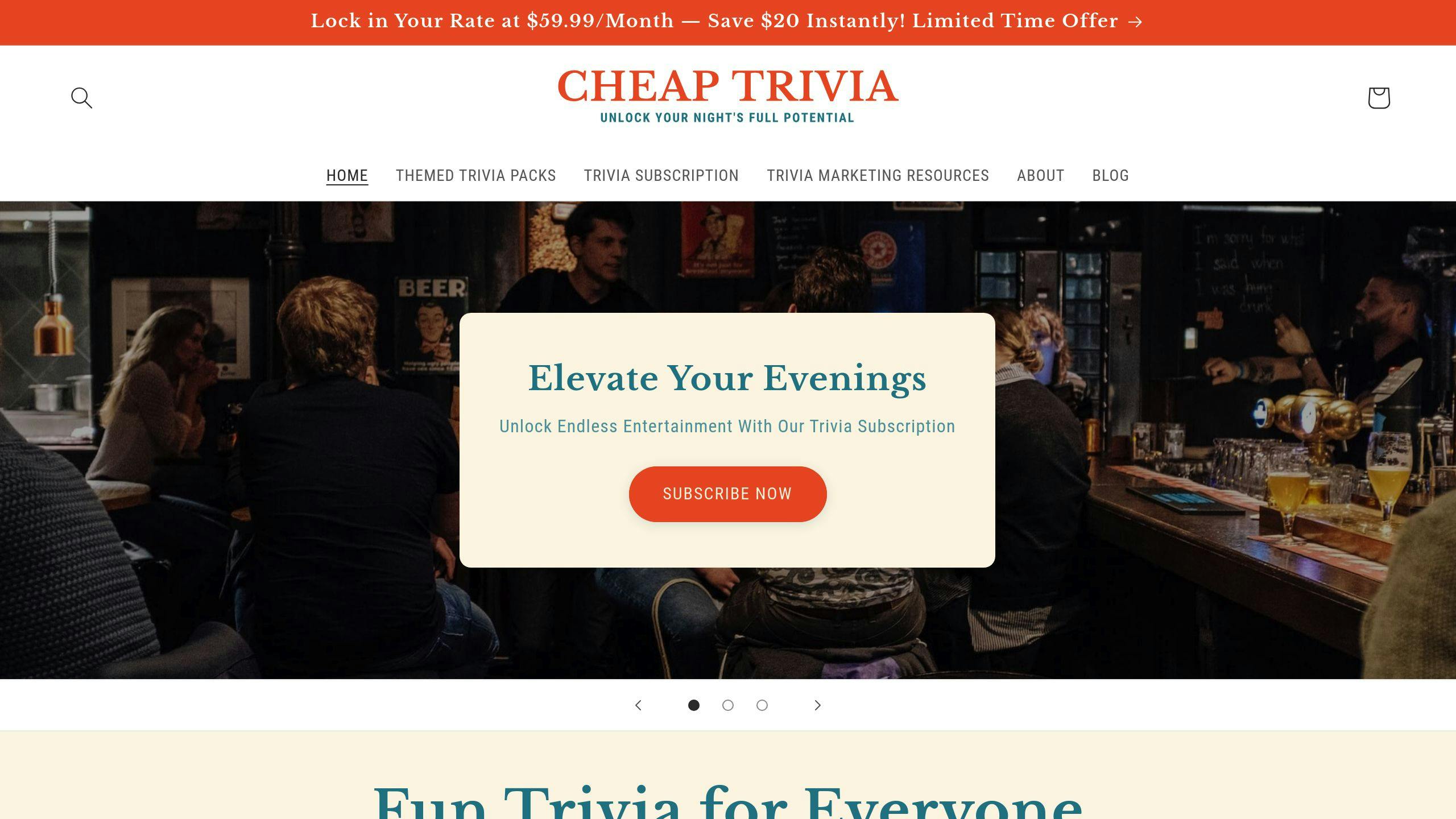History trivia nights are a fantastic way to combine fun, learning, and community. They can help venues attract more customers, increase sales, and build loyalty. Whether you're a history buff or just looking for a unique event idea, here's what makes history trivia nights stand out:
- Broad Appeal: Covers a wide range of topics and eras, from Ancient Egypt to World War II, ensuring there's something for everyone.
- Business Benefits: Boosts food and drink sales, builds customer loyalty, and creates a lively atmosphere.
- Engagement: Encourages community connections through friendly competition.
Quick Tips for Hosting History Trivia Nights:
- Mix Question Difficulty: Use 40% easy, 40% medium, and 20% challenging questions.
- Use Visuals: Incorporate images, audio clips, and props to make the experience immersive.
- Theme Packs: Save prep time by using ready-made trivia packs like Roman Empire or World War II themes.
- Promote Smartly: Use social media, themed decor, and discounts to draw attention.
- Add Themed Food/Drinks: Offer menu items inspired by the historical era.
History trivia nights can turn quiet evenings into exciting gatherings, making them a win-win for both businesses and participants.
7 Steps to Setting Up a Kickass Trivia Night
Creating a Great History Trivia Experience
Planning a history trivia night takes some effort, but with the right approach, it can be both engaging and unforgettable.
Picking Historical Eras and Topics That Draw Interest
Focus on eras that tell compelling stories and appeal to a wide audience. Times like Ancient Egypt offer plenty of material for trivia, covering everything from everyday life and culture to major battles and political events.
To keep things fresh, switch up your themes regularly. Here are a few ways to organize your topics:
- By timeline: Progress through history, starting with ancient civilizations and moving to modern times.
- By region: Highlight the histories of different parts of the world.
- By theme: Dive into topics like wars, inventions, or cultural shifts.
Balancing Question Difficulty
A well-structured trivia game includes a mix of question difficulties:
- 40% easy questions: Covering basic facts that most people know.
- 40% medium questions: Exploring the significance of events or figures.
- 20% challenging questions: Focusing on lesser-known details or connections.
Start with easier questions to build confidence, then gradually increase the difficulty to keep things exciting for both casual players and history buffs.
Using Visuals and Interactive Features
Spice up the traditional Q&A format by adding multimedia and interactive elements:
- Images: Show maps, artifacts, or photographs tied to the topic.
- Audio clips: Play famous speeches or period music.
- Props or replicas: Share visuals of historical items to bring the past to life.
For instance, during an Ancient Egypt round, you could feature images of hieroglyphics or pyramids. These additions make the experience more immersive and fun for participants.
Combine these techniques with themed trivia packs to create a dynamic and memorable event, as explored in the next section.
Using History Trivia Theme Packs
Pre-made theme packs can save time and effort while still delivering an engaging trivia experience. These ready-to-use sets help venues host trivia nights packed with fun and historical depth, without requiring hours of research and preparation.
Roman Empire Theme Pack

Dive into the rise and fall of one of the world's most influential civilizations with this Roman Empire pack. It includes:
- Over 40 questions covering military campaigns, daily life, and cultural milestones
- High-quality images of artifacts, monuments, and historical sites
- PDF handouts designed for participants
- PowerPoint rounds that you can customize to fit your event
- Adjustable difficulty settings to suit different audiences
Pair this pack with multimedia tools (like those discussed earlier) to create an even more engaging trivia night.
World War II Theme Pack

Explore one of the most pivotal conflicts in history with the World War II theme pack. This set offers:
- Questions focused on battles, maps, and life on the home front, spread across four rounds
- Authentic historical photographs and detailed maps
- Difficulty levels tailored for both casual players and serious history buffs
- Weekly updates with new content for subscribers
Other Popular Historical Themes
Looking to switch things up? Here are some additional themes that can keep your trivia nights fresh and exciting:
- Ancient Greece: Explore mythology, philosophy, and the origins of democracy.
- The Renaissance: Highlight art, scientific discoveries, and cultural shifts.
- The American Revolution: Dive into colonial life, key battles, and the founding documents of a nation.
- The Middle Ages: Cover castle life, the feudal system, and medieval inventions.
These options let you cater to a variety of interests while keeping your trivia events engaging and dynamic.
sbb-itb-46dff1a
Promoting and Optimizing Your History Trivia Events
Marketing Strategies for Trivia Nights
Spread the word about your trivia nights with creative and targeted promotions. Here are some ideas to get started:
- Use themed decorations that reflect the historical era of your event.
- Offer discounts for early team registrations to encourage sign-ups.
- Place table tents with interesting historical facts to spark curiosity.
- Hand out flyers at local businesses, schools, and universities.
- Collaborate with nearby restaurants for cross-promotions to reach a broader audience.
Using Social Media for Engagement
Social media is a powerful tool to connect with history buffs and build excitement for your event. Try these approaches:
- Create Facebook event pages with eye-catching historical visuals.
- Share behind-the-scenes photos of your preparation process.
- Post daily "history fact of the day" teasers to engage your audience.
- Run targeted ads to reach history enthusiasts in your area.
- Encourage attendees to share their experiences using a unique event hashtag.
Working with Local Historical Societies
Teaming up with local historical societies can add depth and credibility to your trivia night. Here are some ways to collaborate:
- Invite members from the society to serve as guest judges.
- Showcase authentic historical artifacts during your event.
- Promote the event through the society's member newsletters.
- Include special rounds that highlight local history.
- Offer discounts to society members who attend, strengthening ties with the community.
Track attendance and gather feedback after each event to fine-tune your themes and promotional efforts for the future.
Increasing Engagement and Revenue with Themed Trivia
Organizing Trivia Rounds for Participation
Keep your trivia nights lively and engaging by mixing up the question formats. Try adding visual rounds, like identifying landmarks or artifacts, or quick bonus rounds to test players' reflexes. For example, during a Roman Empire trivia night, you could include a visual challenge where teams identify famous ancient structures. These varied formats ensure everyone stays involved and excited.
To keep participants motivated, structure your questions by difficulty. Start with easier, well-known facts to build confidence, then gradually increase the challenge. This progression keeps the energy up and ensures teams stay engaged throughout the event.
Offering Themed Food and Drink Specials
Boost your revenue by pairing trivia nights with themed food and drink options. For instance, if you're hosting a World War II trivia night, serve dishes or cocktails inspired by that era. You could even create specialty drinks named after key events or historical figures.
Here are a few ideas for themed offerings:
- Team Platters: Shareable appetizer platters designed for groups.
- Historical Cocktails: Drinks inspired by specific events or figures.
- Winner Discounts: Exclusive deals for the winning team to stoke competition.
These themed specials not only enhance the experience but also encourage higher spending.
Making Trivia Nights a Regular Event
Turn your trivia nights into a consistent community event by introducing seasonal point systems. Teams can earn points over multiple sessions, competing for bigger prizes or recognition at the end of the season. This approach keeps people coming back and builds a loyal following.
Keep things fresh by rotating themes. Explore different eras, from ancient civilizations to modern history, or focus on specific events. This variety ensures your trivia nights remain exciting and engaging week after week.
Conclusion: Using History Trivia to Boost Your Business
History trivia nights can turn your venue into a lively spot for both learning and fun. By hosting these themed events, you can create unforgettable experiences that keep customers coming back and help grow your business.
Here are a few tips to make your trivia nights stand out:
- Collaborate with local historical societies to bring expertise and authenticity to your events.
- Offer themed food and drinks that match the historical periods featured in your trivia.
- Leverage social media to build excitement and share highlights from past events.
- Stick to a regular schedule to attract a dedicated group of history fans.
These tactics not only strengthen community ties but also help boost your revenue.
Combining education, entertainment, and social interaction ensures everyone - no matter their knowledge level - can enjoy the experience. With these strategies in play, you can turn quiet weeknights into bustling gatherings that build customer loyalty and drive growth.
